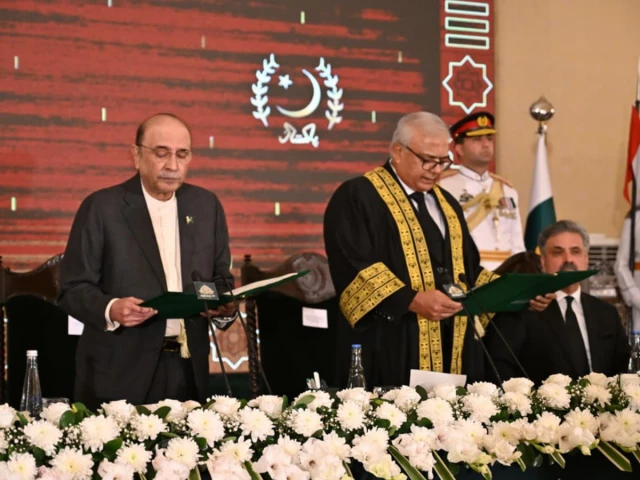Describes the creation of FCC as an important step in our national constitutional journey
President Asif Ali Zardari swears in Justice Aminuddin Khan as the Chief Justice of the Federal Constitutional Court at a ceremony at Aiwan-i-Sadr on Friday. Photo: APP
Federal Constitutional Court Chief Justice Aminuddin Khan on Friday pledged to uphold the Constitution with “transparency, independence and integrity”, saying the protection of fundamental rights is the court’s top priority.
In his first public message since assuming office, Justice Aminuddin Khan described the establishment of the FCC as “an important milestone in our national constitutional journey” that renews Pakistan’s commitment to the rule of law.
The Federal Constitutional Court was established under the 27th constitutional amendment adopted on November 13. The amendment stipulated that the FCC would have original jurisdiction in constitutional disputes despite strong resistance from opposition groups and fundamental rights enforcement cases.
All pending petitions or appeals before the Supreme Court or its constitutional chambers, established under the 26th Constitutional Amendment, must be transferred to the FCC. The amendment also abolished the suo motu powers of the SC and removed Articles 184, 186 and 191A.
Justice Aminuddin highlighted the seriousness of the Court’s mandate, describing it as going beyond mere judgment. “The role of this court is not merely judicial; it is a sacred trust that directly affects the lives, liberties, and aspirations of the nation’s citizens,” he said in the message posted on the FCC website.
The Chief Justice laid out an ambitious vision for the institution, promising that “every matter before us will be handled with exceptional care and fairness, consistent with constitutional supremacy, principles of justice and judicial dignity.”
Read: Four IHC judges prepare to challenge the 27th constitutional amendment
He emphasized the Court’s commitment to establishing a judicial tradition based on reasoned judgments and public trust, which he said are “fundamental to any constitutional court.”
“My sincere wish is that the Federal Constitutional Court should be the guardian of constitutional supremacy in Pakistan and a strong symbol of justice for generations to come,” Justice Khan said. “May Allah grant us the wisdom, humility and unwavering commitment to the Constitution necessary to fulfill our duties,” he prayed.
Federal constitutional courts
The 27th Constitutional Amendment was widely seen as a blow to the independence of the judiciary, with critics warning that the Supreme Court could be placed under the thumb of the Federal Constitutional Court (FCC), whose first chief justice would be appointed by the executive branch.
The creation of the court has attracted attention from legal experts and opposition benches who question whether it will operate independently or serve to consolidate the government’s influence on constitutional matters.
Learn more: FCC lets SC judges question court’s own status
Four judges of the Islamabad High Court have prepared a draft petition to challenge the 27th constitutional amendment, it was learned on Thursday. According to the sources, a draft petition has been prepared and forwarded to the apex court for filing, with the formal submission expected later.
Justices Mohsin Akhtar Kiani and Babar Sattar are among the petitioners, while Justices Saman Rafat Imtiaz and Sardar Ejaz Ishaq Khan are also part of the group challenging the legislation.
SC judges Athar Minallah and Justice Mansoor Ali Shah submitted their resignations a day after the amendment was passed. “The Twenty-Seventh Constitutional Amendment constitutes a grave attack on the Constitution of Pakistan. It dismantles the Supreme Court of Pakistan, subjects the judiciary to executive control and strikes at the very heart of our constitutional democracy, making the judiciary more distant, fragile and vulnerable to power,” Justice Mansoor said in his resignation.




